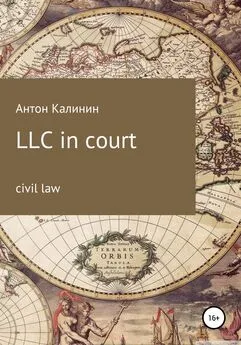Антон Калинин - LLC in court
- Название:LLC in court
- Автор:
- Жанр:
- Издательство:неизвестно
- Год:2022
- ISBN:нет данных
- Рейтинг:
- Избранное:Добавить в избранное
-
Отзывы:
-
Ваша оценка:
Антон Калинин - LLC in court краткое содержание
The relevance of this topic is primarily due to the fact that the representation of corporate entities is an integral part of the interaction of legal entities with the court. The object of the study is presented in the form of representation of corporate entities in court. The subject of the study is regulatory legal acts regulating the representation of corporate entities. I think that this book will be useful for many managers and specialists.
I wish you a pleasant reading.
Приветствую тебя, дорогой читатель! Актуальность данной темы обусловлена в первую очередь тем, что представительство интересов юридических лиц является неотъемлемой частью взаимодействия юридических лиц с судом. Я желаю вам приятного чтения. Также хочу заметить то, что прочитав это вы расширите словарный запас, особенно это актуально для юристов-международников.
LLC in court - читать онлайн бесплатно ознакомительный отрывок
Интервал:
Закладка:
Антон Калинин
LLC in court
I With the development of society, the processes of interaction between people have become more complicated. Knowledge of the laws was highly valued, and jurisprudence was considered a God-pleasing matter. In ancient Rome, for a long time, citizens were forced to represent their interests in court in person. After a while, exceptions were introduced due to gender, age, etc . The history of the domestic institute of law went through 4 stages of formation before the modern system was formed: 1) the bar in the period before 1864; 2) from the moment of Judicial reform until 1917; 3) from 1917 to 1991; 4) and, finally, the modern industry.
And only the regulation of 1832 regulated the activities of representatives in commercial courts to some extent. The “historical breakthrough” in this direction was the act “Establishment of judicial institutions”, which was approved by Alexander II. However, sworn attorneys were forbidden: 1) to act in court against relatives; 2) represent the interests of both parties simultaneously; 3) disclose information received from the principal.
By the declaration of the provisional Government of 03.03.1917, women were allowed to participate in court disputes. According to the decree of the Council of People's Commissars “On the Court” on 11/24/1917, the institute of court attorneys was excluded. In the 1960s, the codification of substantive and procedural civil law took place. On October 24, 1993, the Constitution of the Russian Federation was adopted, the model of which is still used in modern Russia.
Representation of corporate entities in court is an integral element of the successful resolution of the case in favor of the company. It is worth noting that the representation of corporate entities can occur not only in the Arbitration Court, but, for example, in the world. I will give an example from personal experience. While practicing at the Moscow Magistrate's Court, I happened to observe an interesting case: two representatives of large companies presented arguments in defense of their clients. On the one hand there was an LLC, and on the other – an insurance company. The LLC had a claim against the insurance company regarding the refusal to reimburse the insured event. On the part of the LLC, there were arguments that were based on the conditions prescribed in the contract. On the part of the insurance company, there were arguments based on the criteria of the insured event, on which the amount of compensation depended. As a result, since the representatives successfully built arguments without violating the order of behavior in the courtroom, then, as a result, they managed to come to a mutual consensus, during which with.
In the Arbitration Court, the subject is economic disputes. For example, in 2014, Start-Invest LLC was declared bankrupt and recognized as a pyramid scheme. The defrauded depositors appealed to the Arbitration Court, among them were not only legal entities, but also individuals. The question arises: did individuals have the right to appeal to such an instance? Of course, since the subject of the claim was the economic relations between the participants. There was an important nuance: there were two founders who could not find the property. The company's property was of negligible value. And it was not possible to impose an arrest on personal property, including an apartment, since the defendants in the case had minor children, as well as real estate was recognized as the only housing. Despite the fact that the victims were included in the first, second and subsequent queues, the outcome of the case was on the side of the legal entity.
And now let's consider the reasoning from the representative of the LLC. Firstly, there were significant facts among the arguments of the lawyer of Start-Invest LLC. According to the bankruptcy recognition procedure, a legal entity can exist, avoiding liquidation, if a bankruptcy trustee is appointed, who must bring the company to the stage of “financial recovery”. This is exactly what happened with the above company. Also an important factor (another argument in favor of a legal entity) was such an organization as the deposit insurance agency (hereinafter referred to as the DIA). This company had the authority to reimburse up to 1.4 million rubles to defrauded depositors. Recently, another innovation was under consideration. The amount of insurance compensation was proposed to increase to 10 million rubles. But, in this case, the outcome was more sad.
The fastest customers managed to withdraw money in the amount of an amount exceeding the minimum deposit, a priori from being misled by bank employees regarding the terms of the contract. Some of the depositors managed to stay with their own. Some managed to get minor compensation from the DIA. But most have failed. Of course, the financial scheme of Anna's organization was so flawlessly verified that the representative in court managed to brilliantly protect the interests of the client. In theory, representation in court, especially of corporate entities, has a certain algorithm. First, as in the case of individuals, a claim is filed. The parties are trying to find a consensus to resolve corporate issues, professional conflict analysts (intermediaries) are often involved – specialists who conduct negotiations trying to resolve problems. If this does not help, then representatives of one of the parties file a statement of claim. The judge appoints the time of the court session and the representatives of the parties appear in the hall.
I will give another example. Once in the magistrate's court, during my industrial practice, I happened to observe a case when the representative of the plaintiff was not a specialist in the field of law, but the editor-in-chief, since Article 25 of the Administrative Code of the Russian Federation allows this. Nevertheless, on the basis of a general power of attorney, this specialist was able to receive a fine in the name of the founders. Special attention should be paid to the general power of attorney. Until 2019, a copy of this document was sufficient for the judge to represent the interests of the client. At the moment, the original is required. Another successful example of corporate representation in court is the bankruptcy of TATFONDBANK LLC. This organization, being a bona fide resident, liquidated the debt, approved the liquidation decision by the shareholders' meeting, published its decision in the Kommersant newspaper, and submitted documents to the tax authorities. As a result, this company was able to return money through the DIA to customers in a fairly reasonable time. Another important example that I will give now reflects the difference between such concepts as moral and material harm. A representative of a computer company appeared in the courtroom. The plaintiff, a retired individual, asked the company to reimburse the cost of the damaged laptop and compensation for moral damage. (aggravated osteochondrosis), and she demanded the amount of 50 thousand rubles, and only 10 thousand rubles were actually spent on medicines. The representative was “hooked" on this fact. As a result, the total amount of compensation was reduced. It is also worth noting the fact that a significant aspect in the representation of corporate entities in court is the guarantee of the result. It happens that a representative loses a case, while he is not legally responsible for the result and has the right to withdraw responsibility at any time. Recently, a number of bills have been adopted aimed at increasing the requirements for the status of a representative. At the moment, changes are taking place in the legislation of the Russian Federation regarding the tightening of measures to fulfill obligations for lawyers and lawyers. It is also worth noting that a bill is planned aimed at assigning the status of a lawyer to lawyers and eliminating the latter by 2025.
II
Let's consider the types of representation in civil law, then we will determine the subjective nature of each of them. For a long time, this issue has been considered by various researchers, provisions on subjects of procedural representation exist in legal regulations, for example, in the Civil Procedure Code of the Russian Federation. In the scientific literature there are two subjects of representation: a representative and a person whose interests are represented (principal). To define such a term as “representative of corporate entities” different scientists have carried out a random approach.
For example, Candidate of Legal Sciences V. V. Bulgakov defined a representative as a participant in a court session who performs actions on behalf of and in the interests of represented legal entities, as well as the consequences of such activities. M. V. Bogomolov considered that a representative is a person who provides services for a fee or gratuitously to represent the interests of legal entities within the Civil Code of the Russian Federation and having issued authority. After analyzing the opinions of the authors, it can be summed up that both an individual and a legal entity can be represented in court (in this material, legal entities).
Who can be a representative? The following criteria are presented to representatives, based on Article 49 of the Civil Procedure Code of the Russian Federation: 1) full legal capacity; 2) issued credentials; 3) lack of a certain status. On the basis of Part 1 of Article 37 of the Civil Procedure Code of the Russian Federation: civil procedural capacity arises in full by citizens who have reached the age of 18 years and organizations. Consequently, even after the process of emancipation by court, a minor does not have the right to act as a representative in court, except for legal representation. For example, guided by Part 2 of Article 62 of the RF IC, parents under the age of 16 act as legal representatives of the child in court.
Speaking about the second requirement (powers to conduct a case in court), it should be noted that their absence or defects in the form or content of documents entail the court's denial of the right to representation. Article 51 of the Civil Procedure Code of the Russian Federation establishes a list of certain officials who cannot be representatives in court. These are: judges, investigators and prosecutors. However, they have the right to be representatives of certain bodies (court, prosecutor's office, etc.) or legal representatives. On the basis of clause 5.1 of Article 12 of Federal Law No. 184 of 06.10.1999, a ban on participation as a representative has been established, which applies to deputies (in civil cases) if their activities are carried out on a professional permanent basis. Except for legal representation. In paragraph 5 of Article 17 of Federal Law No. 79 of 27.06.2004, there is also a ban on those persons who fill the position of civil service.
At the moment, the legislator does not impose special requirements for persons who can be representatives.
From the position of V. V. Vlasov, the occurrence of a dispute is a representative who has the appropriate knowledge, but does not have a higher legal education, can provide assistance no worse than a lawyer. Despite the ambiguity of this position, knowledge must also be confirmed by an appropriate document. According to L. V. Voitovich, the requirement of the CAS of the Russian Federation imposes such a criterion as the mandatory presence of a representative of higher legal education, enshrined in Part 1 of Article 48 of the Constitution of the Russian Federation. It is proposed to borrow the norm fixed by Part 1 of Article 55 of the CAS of the Russian Federation on the availability of higher legal education. It was proposed to make additions to Article 49 of the Civil Code of the Russian Federation.
Читать дальшеИнтервал:
Закладка:










